Latest Sheet Music
Aretha Franklin
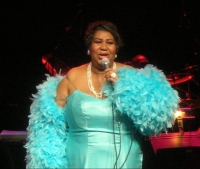
Aretha Louise Franklin (born March 25, 1942) is an American singer, songwriter and pianist self-named and commonly referred to as "The Queen of Soul". Although renowned for her soul recordings, Franklin is also adept at jazz, rock, blues, pop, R&B and gospel. In 2008, the American music magazine Rolling Stone ranked Franklin #1 on its list of The Greatest Singers of All Time.
Franklin is one of the most honored artists by the Grammy Awards, with 20 Grammys to date, which include the Living Legend Grammy and the Lifetime Achievement Grammy. She has scored a total of 20 #1 singles on the Billboard R&B Singles Chart, two of which also became #1 hits on the Billboard Hot 100: "Respect" (1967) and "I Knew You Were Waiting (For Me)" (1987), a duet with George Michael. Since 1961, Franklin has scored a total of 45 "Top 40" hits on the Billboard Hot 100 chart.
In 1987, Franklin became the first female artist to be entered into the Rock and Roll Hall of Fame.
Franklin was the featured singer at the 2009 Presidential inauguration ceremony for Barack Obama.
Franklin is one of the most honored artists by the Grammy Awards, with 20 Grammys to date, which include the Living Legend Grammy and the Lifetime Achievement Grammy. She has scored a total of 20 #1 singles on the Billboard R&B Singles Chart, two of which also became #1 hits on the Billboard Hot 100: "Respect" (1967) and "I Knew You Were Waiting (For Me)" (1987), a duet with George Michael. Since 1961, Franklin has scored a total of 45 "Top 40" hits on the Billboard Hot 100 chart.
In 1987, Franklin became the first female artist to be entered into the Rock and Roll Hall of Fame.
Franklin was the featured singer at the 2009 Presidential inauguration ceremony for Barack Obama.
Andrew Lloyd Webber

Andrew Lloyd Webber, Baron Lloyd-Webber (born 22 March 1948) is an English composer of musical theatre, the elder son of organist William Lloyd Webber and brother of the cellist Julian Lloyd Webber. Lloyd Webber started composing at the age of six, and published his first piece at the age of nine.
Lloyd Webber has achieved great popular success, with several musicals that have run for more than a decade both in the West End and on Broadway. He has composed 13 musicals, a song cycle, a set of variations, two film scores, and a Latin Requiem Mass. He has also gained a number of honours, including a knighthood in 1992, followed by a peerage from the British Government for services to Music, seven Tony Awards (and 40 nominations), three Grammy Awards (with an additional 60 nominations), an Academy Award (two other nominations), seven Olivier Awards (with 100 nominations), a Golden Globe, and the Kennedy Center Honors in 2006. Several of his songs, notably "The Music of the Night" from The Phantom of the Opera, "I Don't Know How to Love Him" from Jesus Christ Superstar, "Don't Cry for Me, Argentina" from Evita, "Any Dream Will Do" from Joseph and the Amazing Technicolor Dreamcoat and "Memory" from Cats have been widely recorded and were hits outside of their parent musicals. His company, the Really Useful Group, is one of the largest theatre operators in London.
Producers in several parts of the UK have staged productions, including national tours, of Lloyd Webber's musicals under licence from the Really Useful Group. According to britishhitsongwriters.com, he is the one hundredth most successful songwriter in U.K. singles chart history, based on weeks that his compositions have spent on the chart.
Lloyd Webber has achieved great popular success, with several musicals that have run for more than a decade both in the West End and on Broadway. He has composed 13 musicals, a song cycle, a set of variations, two film scores, and a Latin Requiem Mass. He has also gained a number of honours, including a knighthood in 1992, followed by a peerage from the British Government for services to Music, seven Tony Awards (and 40 nominations), three Grammy Awards (with an additional 60 nominations), an Academy Award (two other nominations), seven Olivier Awards (with 100 nominations), a Golden Globe, and the Kennedy Center Honors in 2006. Several of his songs, notably "The Music of the Night" from The Phantom of the Opera, "I Don't Know How to Love Him" from Jesus Christ Superstar, "Don't Cry for Me, Argentina" from Evita, "Any Dream Will Do" from Joseph and the Amazing Technicolor Dreamcoat and "Memory" from Cats have been widely recorded and were hits outside of their parent musicals. His company, the Really Useful Group, is one of the largest theatre operators in London.
Producers in several parts of the UK have staged productions, including national tours, of Lloyd Webber's musicals under licence from the Really Useful Group. According to britishhitsongwriters.com, he is the one hundredth most successful songwriter in U.K. singles chart history, based on weeks that his compositions have spent on the chart.
Antonio Carlos Jobim

Antonio Carlos Brasileiro de Almeida Jobim (January 25, 1927 in Rio de Janeiro – December 8, 1994 in New York City), also known as Tom Jobim, was a Grammy Award-winning Brazilian songwriter, composer, arranger, singer, and pianist/guitarist. A primary force behind the creation of the bossa nova style, Jobim is acknowledged as one of the most influential popular composers of the 20th century. His songs have been performed by many singers and instrumentalists within Brazil and internationally.
Shahrdad Rohani
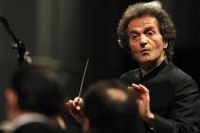
Shahrdad Rohani(Persian: شهرداد روحانی) is an Iranian composer, violinist/pianist, and conductor.
David Lanz
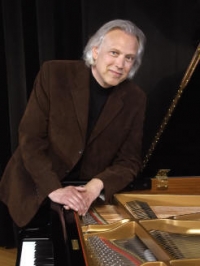
David Lanz (born June 28, 1950 in Seattle, Washington) is a Grammy-nominated New Age pianist. He has released 13 albums, each having some chart success. His most famous album, Cristofori's Dream, topped the New Age charts in 1988, which was Number One on Billboard's first adult alternative/New Age chart for 27 weeks and eventually sold platinum. Natural States peaked at place 125 on the Billboard 200.
Lanz's goal is to have his music create an atmosphere of enlightenment. In an interview with Barnes & Noble, Lanz stated that he wanted to create an atmosphere similar to that of Steven Halpern's music, but with a "more popular hook in it".
Lanz has said himself, " is the most divinely inspired instrument on the planet. It presents a great attraction to our left-right brain relationship. My goal is to create entertainment that also provides enlightenment."
Lanz's goal is to have his music create an atmosphere of enlightenment. In an interview with Barnes & Noble, Lanz stated that he wanted to create an atmosphere similar to that of Steven Halpern's music, but with a "more popular hook in it".
Lanz has said himself, " is the most divinely inspired instrument on the planet. It presents a great attraction to our left-right brain relationship. My goal is to create entertainment that also provides enlightenment."
Puccini

Giacomo Antonio Domenico Michele Secondo Maria Puccini (December 22, 1858 – November 29, 1924) was an Italian composer whose operas, including La Bohème, Tosca, and Madama Butterfly, are among the most frequently performed in the standard repertoire. Some of his arias, such as "O Mio Babbino Caro" from Gianni Schicchi, "Che gelida manina" from La Bohème, and "Nessun Dorma" from Turandot, have become part of popular culture.
The subject of Puccini's style is one that has been long avoided by musicologists; this avoidance can perhaps be attributed to the perception that his work, with its emphasis on melody and evident popular appeal, lacked "seriousness" (a similar prejudice beset Rachmaninoff during his lifetime). Despite the place Puccini clearly occupies in the popular tradition of Verdi, his style of orchestration also shows the strong influence of Wagner, matching specific orchestral configurations and timbres to different dramatic moments. His operas contain an unparalleled manipulation of orchestral colors, with the orchestra often creating the scene’s atmosphere.
The structures of Puccini's works are also noteworthy. While it is to an extent possible to divide his operas into arias or numbers (like Verdi's), his scores generally present a very strong sense of continuous flow and connectivity, perhaps another sign of Wagner’s influence. Like Wagner, Puccini used leitmotifs to connote characters (or combinations of characters). This is apparent in Tosca, where the three chords which signal the beginning of the opera are used throughout to announce Scarpia. Several motifs are also linked to Mimi and the Bohemians in La Bohème and to Cio-Cio-San's eventual suicide in Butterfly. Unlike Wagner, though, Puccini's motifs are static: where Wagner's motifs develop into more complicated figures as the characters develop, Puccini's remain more or less identical throughout the opera (in this respect anticipating the themes of modern musical theatre).
The subject of Puccini's style is one that has been long avoided by musicologists; this avoidance can perhaps be attributed to the perception that his work, with its emphasis on melody and evident popular appeal, lacked "seriousness" (a similar prejudice beset Rachmaninoff during his lifetime). Despite the place Puccini clearly occupies in the popular tradition of Verdi, his style of orchestration also shows the strong influence of Wagner, matching specific orchestral configurations and timbres to different dramatic moments. His operas contain an unparalleled manipulation of orchestral colors, with the orchestra often creating the scene’s atmosphere.
The structures of Puccini's works are also noteworthy. While it is to an extent possible to divide his operas into arias or numbers (like Verdi's), his scores generally present a very strong sense of continuous flow and connectivity, perhaps another sign of Wagner’s influence. Like Wagner, Puccini used leitmotifs to connote characters (or combinations of characters). This is apparent in Tosca, where the three chords which signal the beginning of the opera are used throughout to announce Scarpia. Several motifs are also linked to Mimi and the Bohemians in La Bohème and to Cio-Cio-San's eventual suicide in Butterfly. Unlike Wagner, though, Puccini's motifs are static: where Wagner's motifs develop into more complicated figures as the characters develop, Puccini's remain more or less identical throughout the opera (in this respect anticipating the themes of modern musical theatre).
Schumann

Robert Schumann, sometimes given as Robert Alexander Schumann, (June 8, 1810 – July 29, 1856) was a German composer, aesthete and influential music critic. He is one of the most famous Romantic composers of the 19th century.
He had hoped to pursue a career as a virtuoso pianist, having been assured by his teacher Friedrich Wieck that he could become the finest pianist in Europe after only a few years of study with him. However, a hand injury prevented those hopes from being realized, and he decided to focus his musical energies on composition. Schumann's published compositions were, until 1840, all for the piano; he later composed works for piano and orchestra, many lieder (songs for voice and piano), four symphonies, an opera, and other orchestral, choral and chamber works. His writings about music appeared mostly in the Neue Zeitschrift für Musik ("The New Journal for Music"), a Leipzig-based publication that he jointly founded.
In 1840, after a long and acrimonious legal battle with his piano instructor Friedrich Wieck, Schumann married Wieck's daughter, pianist Clara Wieck, a considerable figure of the Romantic period in her own right. Clara Wieck showcased many works by her husband as well. For the last two years of his life, after an attempted suicide, Schumann was confined to a mental institution.
He had hoped to pursue a career as a virtuoso pianist, having been assured by his teacher Friedrich Wieck that he could become the finest pianist in Europe after only a few years of study with him. However, a hand injury prevented those hopes from being realized, and he decided to focus his musical energies on composition. Schumann's published compositions were, until 1840, all for the piano; he later composed works for piano and orchestra, many lieder (songs for voice and piano), four symphonies, an opera, and other orchestral, choral and chamber works. His writings about music appeared mostly in the Neue Zeitschrift für Musik ("The New Journal for Music"), a Leipzig-based publication that he jointly founded.
In 1840, after a long and acrimonious legal battle with his piano instructor Friedrich Wieck, Schumann married Wieck's daughter, pianist Clara Wieck, a considerable figure of the Romantic period in her own right. Clara Wieck showcased many works by her husband as well. For the last two years of his life, after an attempted suicide, Schumann was confined to a mental institution.
Handel

George Frideric Handel (Friday, 23 February 1685 - Saturday, 14 April 1759) was a German-born Baroque composer who is famous for his operas, oratorios and concerti grossi. Born as Georg Friedrich Handel in Halle, he spent most of his adult life in England, becoming a subject of the British crown on 22 January 1727. His most famous works are Messiah, an oratorio set to texts from the King James Bible; Water Music; and Music for the Royal Fireworks. Strongly influenced by the techniques of the great composers of the Italian Baroque and the English composer Henry Purcell, his music was known to many significant composers who came after him, including Haydn, Mozart, and Beethoven.
Handel's compositions include 42 operas; 29 oratorios; more than 120 cantatas, trios and duets; numerous arias; chamber music; a large number of ecumenical pieces; odes and serenatas; and sixteen organ concerti. His most famous work, the Messiah oratorio with its "Hallelujah" chorus, is among the most popular works in choral music and has become a centerpiece of the Christmas season. Also popular are the Opus 3 and 6 Concerti Grossi, as well as "The Cuckoo and the Nightingale", in which birds are heard calling during passages played in different keys representing the vocal ranges of two birds. Also notable are his sixteen keyboard suites, especially The Harmonious Blacksmith.
Handel introduced various previously uncommon musical instruments in his works: the viola d'amore and violetta marina (Orlando), the lute (Ode for St. Cecilia's Day), three trombones (Saul), clarinets or small high cornets (Tamerlano), theorbo, French horn (Water Music), lyrichord, double bassoon, viola da gamba, bell chimes, positive organ, and harp (Giulio Cesare, Alexander's Feast).
Handel's compositions include 42 operas; 29 oratorios; more than 120 cantatas, trios and duets; numerous arias; chamber music; a large number of ecumenical pieces; odes and serenatas; and sixteen organ concerti. His most famous work, the Messiah oratorio with its "Hallelujah" chorus, is among the most popular works in choral music and has become a centerpiece of the Christmas season. Also popular are the Opus 3 and 6 Concerti Grossi, as well as "The Cuckoo and the Nightingale", in which birds are heard calling during passages played in different keys representing the vocal ranges of two birds. Also notable are his sixteen keyboard suites, especially The Harmonious Blacksmith.
Handel introduced various previously uncommon musical instruments in his works: the viola d'amore and violetta marina (Orlando), the lute (Ode for St. Cecilia's Day), three trombones (Saul), clarinets or small high cornets (Tamerlano), theorbo, French horn (Water Music), lyrichord, double bassoon, viola da gamba, bell chimes, positive organ, and harp (Giulio Cesare, Alexander's Feast).
Ludovico Einaudi

Ludovico Einaudi (born 23 November 1955) is an Italian contemporary classical music composer and pianist.
Although Einaudi would prefer not to be labeled as any particular type of genre, he is sometimes referred to as Minimalist. This is despite his music not sharing the key musical properties associated with minimalism. This may be due to his music possessing sparse orchestration and simplistic melodies that some may wish to refer to as 'minimalist' despite not belonging to the musical movement of Minimalism.
Einaudi's own words on the matter reflect this viewpoint, with Einaudi referring to Minimalism as "elegance and openness", despite its more formal definition as a musical movement to which he arguably does not belong.
Although Einaudi would prefer not to be labeled as any particular type of genre, he is sometimes referred to as Minimalist. This is despite his music not sharing the key musical properties associated with minimalism. This may be due to his music possessing sparse orchestration and simplistic melodies that some may wish to refer to as 'minimalist' despite not belonging to the musical movement of Minimalism.
Einaudi's own words on the matter reflect this viewpoint, with Einaudi referring to Minimalism as "elegance and openness", despite its more formal definition as a musical movement to which he arguably does not belong.
Beethoven

Ludwig van Beethoven (16 December 1770 - 26 March 1827) was a German composer and pianist. He was a crucial figure in the transitional period between the Classical and Romantic eras in Western classical music, and remains one of the most respected and influential composers of all time.
Born in Bonn, then in the Electorate of Cologne (now in modern-day Germany), he moved to Vienna in his early twenties and settled there, studying with Joseph Haydn and quickly gaining a reputation as a virtuoso pianist. Beethoven's hearing gradually deteriorated beginning in his twenties, yet he continued to compose masterpieces, and to conduct and perform, even after he was completely deaf.
Born in Bonn, then in the Electorate of Cologne (now in modern-day Germany), he moved to Vienna in his early twenties and settled there, studying with Joseph Haydn and quickly gaining a reputation as a virtuoso pianist. Beethoven's hearing gradually deteriorated beginning in his twenties, yet he continued to compose masterpieces, and to conduct and perform, even after he was completely deaf.
Tchaikovsky

Pyotr Il'yich Tchaikovsky (May 7 1840 â November 6 1893) was a Russian composer of the Romantic era. While not part of the nationalistic music group known as "The Five", Tchaikovsky wrote music which, in the opinion of Harold Schonberg, was distinctly Russian: plangent, introspective, with modally-inflected melody and harmony.
Aesthetically, Tchaikovsky remained open to all aspects of Saint Petersburg musical life. He was impressed by Serov and Balakirev as well as the classical values upheld by the conservatory. Both the progressive and conservative camps in Russian music at the time attempted to win him over. Tchaikovsky charted his compositional course between these two factions, retaining his individuality as a composer as well as his Russian identity. In this he was influenced by the ideals of his teacher Nikolai Rubinstein and Nikolai's brother Anton.
Tchaikovsky's musical cosmopolitanism led him to be favored by many Russian music-lovers over the "Russian" harmonies and styles of Mussorgsky, Borodin and Rimsky-Korsakov.
Nonetheless he frequently adapted Russian traditional melodies and dance forms in his music, which enhanced his success in his home country. The success in St. Petersburg at the premiere of his Third Orchestral Suite may have been due in large part to his concluding the work with a polonaise. He also used a polonaise for the final movement of his Third Symphony.
Aesthetically, Tchaikovsky remained open to all aspects of Saint Petersburg musical life. He was impressed by Serov and Balakirev as well as the classical values upheld by the conservatory. Both the progressive and conservative camps in Russian music at the time attempted to win him over. Tchaikovsky charted his compositional course between these two factions, retaining his individuality as a composer as well as his Russian identity. In this he was influenced by the ideals of his teacher Nikolai Rubinstein and Nikolai's brother Anton.
Tchaikovsky's musical cosmopolitanism led him to be favored by many Russian music-lovers over the "Russian" harmonies and styles of Mussorgsky, Borodin and Rimsky-Korsakov.
Nonetheless he frequently adapted Russian traditional melodies and dance forms in his music, which enhanced his success in his home country. The success in St. Petersburg at the premiere of his Third Orchestral Suite may have been due in large part to his concluding the work with a polonaise. He also used a polonaise for the final movement of his Third Symphony.
Chopin

Frédéric Chopin (1 March 1810 – 17 October 1849) was a Polish composer and virtuoso pianist of the Romantic period. He is widely regarded as the greatest Polish composer, and ranks as one of music's greatest tone poets.
He was born in the village of Żelazowa Wola, in the Duchy of Warsaw, to a Polish mother and French-expatriate father, and in his early life was regarded as a child-prodigy pianist. In November 1830, at the age of 20, Chopin went abroad; following the suppression of the Polish November Uprising of 1830–31, he became one of many expatriates of the Polish "Great Emigration."
In Paris, he made a comfortable living as a composer and piano teacher, while giving few public performances. A Polish patriot,
Chopin's extant compositions were written primarily for the piano as a solo instrument. Though technically demanding, Chopin's style emphasizes nuance and expressive depth rather than virtuosity. Chopin invented musical forms such as the ballade and was responsible for major innovations in forms such as the piano sonata, waltz, nocturne, étude, impromptu and prelude. His works are mainstays of Romanticism in 19th-century classical music.
He was born in the village of Żelazowa Wola, in the Duchy of Warsaw, to a Polish mother and French-expatriate father, and in his early life was regarded as a child-prodigy pianist. In November 1830, at the age of 20, Chopin went abroad; following the suppression of the Polish November Uprising of 1830–31, he became one of many expatriates of the Polish "Great Emigration."
In Paris, he made a comfortable living as a composer and piano teacher, while giving few public performances. A Polish patriot,
Chopin's extant compositions were written primarily for the piano as a solo instrument. Though technically demanding, Chopin's style emphasizes nuance and expressive depth rather than virtuosity. Chopin invented musical forms such as the ballade and was responsible for major innovations in forms such as the piano sonata, waltz, nocturne, étude, impromptu and prelude. His works are mainstays of Romanticism in 19th-century classical music.
Rimsky-Korsakoff
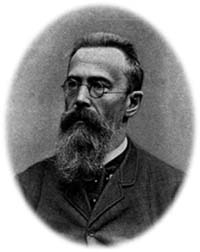
Nikolai Andreyevich Rimsky-Korsakov, also Nikolay, Nicolai, and Rimsky-Korsakoff, (18 March 1908) was a Russian composer, one of Russian composers known as "The Five", and was later a teacher of harmony and orchestration. He is particularly noted for a predilection for folk and fairy-tale subjects, and for his extraordinary skill in orchestration, which may have been influenced by his synesthesia. The first part of his surname, Rimsky, is due to the fact that some of his forefathers undertook a pilgrimage to Rome.
Like his compatriot Cui, he expended his greatest efforts on his 15 operas. Subjects range from historical melodramas (The Tsar's Bride) to folk operas (May Night) to fairytales and legends (Snowmaiden, Kashchey the Immortal and The Tale of Tsar Saltan). In juxtaposed depictions of real and fantastic, the operas invoke folk melodies, realistic declamation, lyrical melodies, and artificially-constructed harmonies with effective orchestral expression. Most of Rimsky-Korsakov's operas remain in the standard repertoire in Russia to this day. While the operas themselves are not well-known in the West, many selections are familiar to Western audiences. These excerpts include "The Dance of the Tumblers" from Snowmaiden, "Procession of the Nobles" from Mlada, "Song of the Indian Guest" (or, less accurately, "Song of India,") from Sadko, and "Flight of the Bumblebee" from Tsar Saltan, as well as suites from The Golden Cockerel and The Legend of the Invisible City of Kitezh and the Maiden Fevroniya.
Rimsky-Korsakov's status in the West has long been based on his orchestral compositions. Best known among these are Capriccio espagnol, Russian Easter Festival Overture, and the symphonic suite Scheherazade. Scheherazade is often cited as a textbook example of Russian orientalism. Likewise, while Capriccio espagnol could be considered a continuation of Glinka's Spanish Fantasies pittoresques, the vibrancy of Rimsky-Korsakov's orchestration far outshines Glinka's effort. It also served as a model for Maurice Ravel's Rapsodie espagnole.
Smaller-scaled works include dozens of art songs, arrangements of folk songs, some chamber and piano music, and a considerable number of choral works, both secular and for Russian Orthodox Church service, including settings of portions of the Liturgy of St. John Chrysostom (the latter despite his staunch atheism).
Like his compatriot Cui, he expended his greatest efforts on his 15 operas. Subjects range from historical melodramas (The Tsar's Bride) to folk operas (May Night) to fairytales and legends (Snowmaiden, Kashchey the Immortal and The Tale of Tsar Saltan). In juxtaposed depictions of real and fantastic, the operas invoke folk melodies, realistic declamation, lyrical melodies, and artificially-constructed harmonies with effective orchestral expression. Most of Rimsky-Korsakov's operas remain in the standard repertoire in Russia to this day. While the operas themselves are not well-known in the West, many selections are familiar to Western audiences. These excerpts include "The Dance of the Tumblers" from Snowmaiden, "Procession of the Nobles" from Mlada, "Song of the Indian Guest" (or, less accurately, "Song of India,") from Sadko, and "Flight of the Bumblebee" from Tsar Saltan, as well as suites from The Golden Cockerel and The Legend of the Invisible City of Kitezh and the Maiden Fevroniya.
Rimsky-Korsakov's status in the West has long been based on his orchestral compositions. Best known among these are Capriccio espagnol, Russian Easter Festival Overture, and the symphonic suite Scheherazade. Scheherazade is often cited as a textbook example of Russian orientalism. Likewise, while Capriccio espagnol could be considered a continuation of Glinka's Spanish Fantasies pittoresques, the vibrancy of Rimsky-Korsakov's orchestration far outshines Glinka's effort. It also served as a model for Maurice Ravel's Rapsodie espagnole.
Smaller-scaled works include dozens of art songs, arrangements of folk songs, some chamber and piano music, and a considerable number of choral works, both secular and for Russian Orthodox Church service, including settings of portions of the Liturgy of St. John Chrysostom (the latter despite his staunch atheism).
Diana Krall
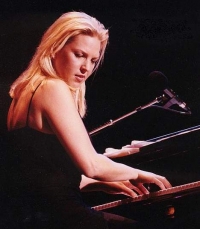
Diana Jean Krall, (born November 16, 1964) is a Canadian jazz pianist and singer.
Krall was born into a musical family in Nanaimo, British Columbia, Canada. She began learning the piano at the age of four. In high school, she started playing in a small jazz group. When she was 15 she started playing regularly in several Nanaimo restaurants.
At age seventeen she won a scholarship from the Vancouver International Jazz Festival to study at the Berklee College of Music in Boston, and completed three terms.
In Nanaimo her playing attracted the attention of famed bass player Ray Brown (ex-husband of the late Ella Fitzgerald, long-time member of the Oscar Peterson Trio and Grammy-winning composer) and drummer Jeff Hamilton. After hearing her play, Brown and Hamilton persuaded Krall to move to Los Angeles, and study with pianist Jimmy Rowles, with whom she began to sing. This also brought her into contact with influential teachers and producers. In 1990, Krall relocated to New York.
Krall was born into a musical family in Nanaimo, British Columbia, Canada. She began learning the piano at the age of four. In high school, she started playing in a small jazz group. When she was 15 she started playing regularly in several Nanaimo restaurants.
At age seventeen she won a scholarship from the Vancouver International Jazz Festival to study at the Berklee College of Music in Boston, and completed three terms.
In Nanaimo her playing attracted the attention of famed bass player Ray Brown (ex-husband of the late Ella Fitzgerald, long-time member of the Oscar Peterson Trio and Grammy-winning composer) and drummer Jeff Hamilton. After hearing her play, Brown and Hamilton persuaded Krall to move to Los Angeles, and study with pianist Jimmy Rowles, with whom she began to sing. This also brought her into contact with influential teachers and producers. In 1990, Krall relocated to New York.
Norah Jones
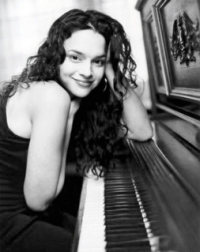
Norah Jones (born Geethali Norah Jones Shankar on March 30, 1979) is an American singer-songwriter, pianist, keyboardist, guitarist, and occasional actress of Anglo-American and Bengali descent. She is the daughter of famed sitar virtuoso Ravi Shankar and half-sister of sitarist Anoushka Shankar.
Jones' career was launched with her 2002 debut album Come Away with Me, an adult contemporary pop/vocal jazz album with a sensual, plaintive soul/folk/country tinge, that sold over twenty million copies worldwide and received five Grammy Awards, with Jones winning "Best New Artist". Her second album, Feels like Home, was released in 2004, clocking more than a million sales in the first week of U.S. release. In 2007, she released her third album, Not Too Late, which debuted at number one on the world charts. She has become one of the most successful recording artists of the decade, racking up sales of more than 16 million records in the US and 39 million records worldwide.
Jones' career was launched with her 2002 debut album Come Away with Me, an adult contemporary pop/vocal jazz album with a sensual, plaintive soul/folk/country tinge, that sold over twenty million copies worldwide and received five Grammy Awards, with Jones winning "Best New Artist". Her second album, Feels like Home, was released in 2004, clocking more than a million sales in the first week of U.S. release. In 2007, she released her third album, Not Too Late, which debuted at number one on the world charts. She has become one of the most successful recording artists of the decade, racking up sales of more than 16 million records in the US and 39 million records worldwide.
Anastasia
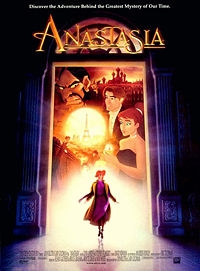
Anastasia is an Academy Award nominated American animated feature musical film produced and directed by Don Bluth and Gary Goldman at Fox Animation Studios, and was released on November 14, 1997 by 20th Century Fox.
The idea for the film originates from Fox's 1956 live-action film version of the same name. Executives at Fox gave Bluth and Goldman the choice of creating an animated adaptation of either the 1956 film or the original play by Marcelle Maurette.
The idea for the film originates from Fox's 1956 live-action film version of the same name. Executives at Fox gave Bluth and Goldman the choice of creating an animated adaptation of either the 1956 film or the original play by Marcelle Maurette.
Corpse Bride
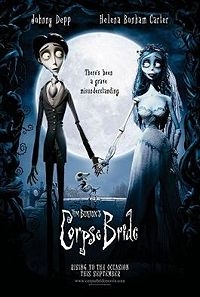
Tim Burton's Corpse Bride (often abbreviated as Corpse Bride) is a 2005 stop-motion-animation film based loosely on a 19th century Russian-Jewish folktale version of an older Jewish story and set in a fictional Victorian era village. It was directed by Tim Burton and Mike Johnson, and filmed at 3 Mills Studios in London. Johnny Depp led an all-star cast as the voice of Victor and Helena Bonham Carter (for whom the project was specially created) as the voice of the title character. This is the first animated film in which Johnny Depp has been a voice actor. The film's initial release was two weeks prior to that of Wallace & Gromit: The Curse of the Were-Rabbit, marking the first time that a stop-motion animated film and a claymation animated one were in simultaneous wide theatrical release. Interestingly, both films feature the voice of Helena Bonham Carter in a lead role and a character named Victor. Coincidentally, Burton's first stop-motion film, The Nightmare Before Christmas was released the same year as Nick Park's The Wrong Trousers.
The film was nominated in the 78th Academy Awards for Best Animated Feature. It lost to Wallace & Gromit: The Curse of the Were-Rabbit.
The film is dedicated to the memory of Joe Ranft.
The movie exhibits Burton's trademark style and recurring themes (the complex interaction between light and darkness, and of being caught between two irreconcilable worlds). Life is portrayed as boring and dully gray tinted while death is more fun, as evidenced by the brighter colors and jaunty music. The movie can be particularly compared to The Nightmare Before Christmas, Burton's previous stop-motion feature project (directed by Henry Selick and based on a Tim Burton poem, which Corpse Bride director Mike Johnson worked on as an animator) and Beetlejuice, especially in the scenes depicting the underworld and its deceased denizens. The studio intentionally emphasized the links, as some commercials for Corpse Bride were accompanied by songs from The Nightmare Before Christmas (specifically, "What's This"); also, in an issue of Disney Adventures, Emily (the title character) was compared to The Nightmare Before Christmas's Sally, despite the stark contrasts in personality between the outspoken, free-spirited Emily and the quiet, timid Sally. The Corpse Bride is also considered to be the spiritual successor of The Nightmare Before Christmas.
Most of the characters in the film bear a strong resemblance to the original cast of the British period drama Upstairs, Downstairs. In the "Special Features" section of the DVD, Tim Burton states that the films' setting pays tribute to the series, with the Land of the Living being the "upstairs", and the Land of the Dead being the "downstairs".
The film was nominated in the 78th Academy Awards for Best Animated Feature. It lost to Wallace & Gromit: The Curse of the Were-Rabbit.
The film is dedicated to the memory of Joe Ranft.
The movie exhibits Burton's trademark style and recurring themes (the complex interaction between light and darkness, and of being caught between two irreconcilable worlds). Life is portrayed as boring and dully gray tinted while death is more fun, as evidenced by the brighter colors and jaunty music. The movie can be particularly compared to The Nightmare Before Christmas, Burton's previous stop-motion feature project (directed by Henry Selick and based on a Tim Burton poem, which Corpse Bride director Mike Johnson worked on as an animator) and Beetlejuice, especially in the scenes depicting the underworld and its deceased denizens. The studio intentionally emphasized the links, as some commercials for Corpse Bride were accompanied by songs from The Nightmare Before Christmas (specifically, "What's This"); also, in an issue of Disney Adventures, Emily (the title character) was compared to The Nightmare Before Christmas's Sally, despite the stark contrasts in personality between the outspoken, free-spirited Emily and the quiet, timid Sally. The Corpse Bride is also considered to be the spiritual successor of The Nightmare Before Christmas.
Most of the characters in the film bear a strong resemblance to the original cast of the British period drama Upstairs, Downstairs. In the "Special Features" section of the DVD, Tim Burton states that the films' setting pays tribute to the series, with the Land of the Living being the "upstairs", and the Land of the Dead being the "downstairs".
Aladdin
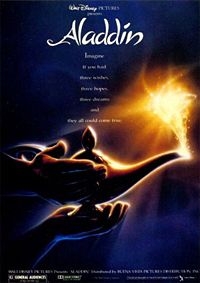
Aladdin is a 1992 animated feature produced by Walt Disney Feature Animation, and released by Walt Disney Pictures on November 25, 1992. The thirty-first animated feature in the Disney animated features canon, the film is based on the Arab folktale of Aladdin and the magic lamp from One Thousand and One Nights. Several characters and plot elements are also based on the 1940 version of The Thief of Bagdad.
The film was directed by John Musker and Ron Clements, both of whom had just finished writing and directing The Little Mermaid (1989). The musical score was written by Alan Menken, with song lyrics written by Howard Ashman and Tim Rice. Aladdin features the voices of Scott Weinger, Jonathan Freeman, Linda Larkin, Frank Welker, Gilbert Gottfried, Douglas Seale, and, as the Genie of the lamp, Robin Williams. Although this was not the first time in which a major actor such as Williams provided voice-over work for an animated film, it was the first major American animated feature film in which particular attention was paid to a celebrity voice cast member, such as a major movie star, in the film as part of its promotion. This has led to a subsequent increased attention to the casts of later productions, as a major element of animated film marketing.
Aladdin was followed by two direct-to-video sequels: The Return of Jafar (1994) and Aladdin and the King of Thieves (1996), and an animated television series, Aladdin, set between the two sequels.
The film was directed by John Musker and Ron Clements, both of whom had just finished writing and directing The Little Mermaid (1989). The musical score was written by Alan Menken, with song lyrics written by Howard Ashman and Tim Rice. Aladdin features the voices of Scott Weinger, Jonathan Freeman, Linda Larkin, Frank Welker, Gilbert Gottfried, Douglas Seale, and, as the Genie of the lamp, Robin Williams. Although this was not the first time in which a major actor such as Williams provided voice-over work for an animated film, it was the first major American animated feature film in which particular attention was paid to a celebrity voice cast member, such as a major movie star, in the film as part of its promotion. This has led to a subsequent increased attention to the casts of later productions, as a major element of animated film marketing.
Aladdin was followed by two direct-to-video sequels: The Return of Jafar (1994) and Aladdin and the King of Thieves (1996), and an animated television series, Aladdin, set between the two sequels.
The Little Mermaid
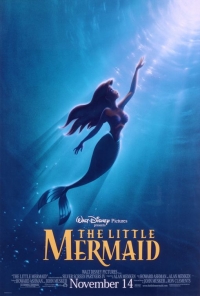
The Little Mermaid is a 1989 animated feature produced by Walt Disney Feature Animation with pencil test began on September 23, 1988 and first released on November 17, 1989 by Walt Disney Pictures with the first Wallace and Gromit short film, A Grand Day Out. The twenty-eighth animated feature in the Disney animated features canon, the film is based on the Hans Christian Andersen fairy tale "The Little Mermaid." During its initial release, it grossed over $84 million in the United States and an additional $99 million internationally.
The film is given credit for breathing life back into the animated feature film genre after a string of critical and commercial failures that had dated to the early 1980s. It also marked the start of the era known as Disney Renaissance.
A stage adaptation of the film with a book by Doug Wright and additional songs by Alan Menken and new lyricist Glenn Slater opened in Denver in July 2007 and began performances on Broadway.
The Little Mermaid: An Original Walt Disney Records Soundtrack is the soundtrack to Disney's 1989 animated feature The Little Mermaid. It contains the songs from the film written by Alan Menken and Howard Ashman, as well as the film's score composed by Alan Menken. The album received the Academy Award for Best Original Score and the Golden Globe Award for Best Original Score.
In October 2006, a new two-disc special edition version of the soundtrack was released to correspond with the two-disc Platinum Edition DVD release of The Little Mermaid. The first disc remains identical to the original release, yet with remastered audio, while the newly added second disc is composed of various newly recorded version of the film's songs by different artists, such as Ashley Tisdale, Raven-Symoné, The Jonas Brothers, and Jessica Simpson. It also includeds two videos, as well as new cover art.
The film is given credit for breathing life back into the animated feature film genre after a string of critical and commercial failures that had dated to the early 1980s. It also marked the start of the era known as Disney Renaissance.
A stage adaptation of the film with a book by Doug Wright and additional songs by Alan Menken and new lyricist Glenn Slater opened in Denver in July 2007 and began performances on Broadway.
The Little Mermaid: An Original Walt Disney Records Soundtrack is the soundtrack to Disney's 1989 animated feature The Little Mermaid. It contains the songs from the film written by Alan Menken and Howard Ashman, as well as the film's score composed by Alan Menken. The album received the Academy Award for Best Original Score and the Golden Globe Award for Best Original Score.
In October 2006, a new two-disc special edition version of the soundtrack was released to correspond with the two-disc Platinum Edition DVD release of The Little Mermaid. The first disc remains identical to the original release, yet with remastered audio, while the newly added second disc is composed of various newly recorded version of the film's songs by different artists, such as Ashley Tisdale, Raven-Symoné, The Jonas Brothers, and Jessica Simpson. It also includeds two videos, as well as new cover art.
Beauty and the Beast
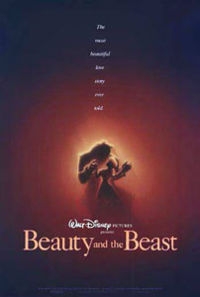
Beauty and the Beast is a 1991 animated American family film. It is the thirtieth animated feature produced by Walt Disney Feature Animation. The film received its premiere at the El Capitan Theatre in Hollywood on November 13, 1991. This film, one of the best known of the Disney studio's films, is based on the well-known fairy tale Beauty and the Beast, about a beautiful woman kept in a castle by a horrific monster. It is the first and only full-length animated feature film to ever be nominated for an Academy Award for Best Picture (it lost to The Silence of the Lambs). Heightening the level of performance in the era known as the Disney Renaissance (1989-1999, beginning with The Little Mermaid and ending with Tarzan ), many animated films following its release have been influenced by its blending of traditional animation and computer generated imagery.
Beauty and the Beast ranked 7th on the American Film Institutes's list of best animated films, #22 on the Institutes's list of best musicals and #34 on its list of the best romantic American movies. On the list of the greatest songs from American movies, Beauty and the Beast ranked #62. The film was adapted into a Broadway musical of the same name, which ran from 1994 to 2007.
In 2002, Beauty and the Beast was added to the United States National Film Registry as being deemed "culturally, historically, or aesthetically significant." In January of the same year, the film was reissued in IMAX format in a special edition edit including a new musical sequence. A two-disc Platinum Edition DVD release followed in October.
Beauty and the Beast ranked 7th on the American Film Institutes's list of best animated films, #22 on the Institutes's list of best musicals and #34 on its list of the best romantic American movies. On the list of the greatest songs from American movies, Beauty and the Beast ranked #62. The film was adapted into a Broadway musical of the same name, which ran from 1994 to 2007.
In 2002, Beauty and the Beast was added to the United States National Film Registry as being deemed "culturally, historically, or aesthetically significant." In January of the same year, the film was reissued in IMAX format in a special edition edit including a new musical sequence. A two-disc Platinum Edition DVD release followed in October.
The Lion King
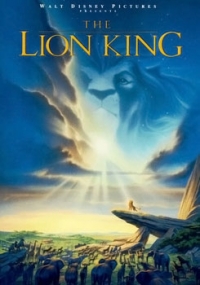
The Lion King is a 1994 American animated feature film produced by Walt Disney Feature Animation, released in theaters on June 15, 1994 by Walt Disney Pictures. It is the 32nd film in the Disney animated feature canon. The film was the highest grossing animated film of all time until the release of Finding Nemo (a Disney/Pixar computer-animated film). The Lion King still holds the record as the highest grossing traditionally animated film in history. This film also belongs to an era known as the Disney Renaissance.
The story, which was strongly influenced by the Shakespearean play Hamlet and Disney's 1942 classic Bambi, takes place in a kingdom of anthropomorphic animals in Africa. A musical film, The Lion King garnered two Academy Awards for its achievement in music. Songs were written by composer Elton John and lyricist Tim Rice, with an original score by Hans Zimmer. Disney later produced two related movies: a sequel, The Lion King II: Simba's Pride; and a part prequel-part parallel, The Lion King 1½.
The Lion King: Original Motion Picture Soundtrack is the original motion picture soundtrack for Walt Disney's The Lion King. The songs were written by Elton John and Tim Rice. The original score was composed and arranged by Hans Zimmer. The soundtrack was recorded in three different countries, namely: USA, UK and South Africa.
The story, which was strongly influenced by the Shakespearean play Hamlet and Disney's 1942 classic Bambi, takes place in a kingdom of anthropomorphic animals in Africa. A musical film, The Lion King garnered two Academy Awards for its achievement in music. Songs were written by composer Elton John and lyricist Tim Rice, with an original score by Hans Zimmer. Disney later produced two related movies: a sequel, The Lion King II: Simba's Pride; and a part prequel-part parallel, The Lion King 1½.
The Lion King: Original Motion Picture Soundtrack is the original motion picture soundtrack for Walt Disney's The Lion King. The songs were written by Elton John and Tim Rice. The original score was composed and arranged by Hans Zimmer. The soundtrack was recorded in three different countries, namely: USA, UK and South Africa.
The Polar Express
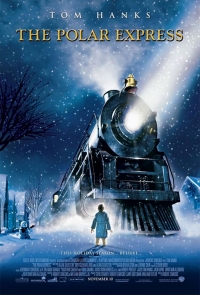
The Polar Express is a 2004 Academy Award-nominated feature film based on the children's book of the same title by Chris Van Allsburg.
The film, written, produced, and directed by Robert Zemeckis, is entirely live action using performance capture technology, which incorporates the movements of live actors into animated characters. It stars actor Tom Hanks in five distinct roles, including the role of Santa Claus. The film was produced by Castle Rock Entertainment in association with Shangri-La Entertainment, ImageMovers, and Playtone, for Warner Bros. Warner Bros. first released the $170 million film in both conventional and IMAX theaters on Wednesday, November 10, 2004.
The Polar Express is the soundtrack to the animated film The Polar Express, released in 2004.
The film, written, produced, and directed by Robert Zemeckis, is entirely live action using performance capture technology, which incorporates the movements of live actors into animated characters. It stars actor Tom Hanks in five distinct roles, including the role of Santa Claus. The film was produced by Castle Rock Entertainment in association with Shangri-La Entertainment, ImageMovers, and Playtone, for Warner Bros. Warner Bros. first released the $170 million film in both conventional and IMAX theaters on Wednesday, November 10, 2004.
The Polar Express is the soundtrack to the animated film The Polar Express, released in 2004.
The Nightmare Before Christmas
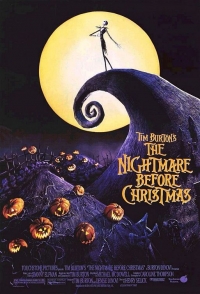
Tim Burton's The Nightmare Before Christmas is a 1993 animated musical film written and produced by Tim Burton, directed by Henry Selick and scored by Danny Elfman. The film was based on Burton's characters and original story.
The film was a critical and commercial success, with particular praise awarded for Tim Burton's original storyline and stop motion animation, combined with Danny Elfman's creative musical score. Following its theatrical, and home video release, the film has earned a significant following, including merchandise, video games and other related media dedicated to the film. The film has also been theatrically re-released on several occasions, including two remastered 3-D versions released in Disney Digital 3-D on October 20, 2006,October 19, 2007 and will make a 3rd re-release on October 24th, 2008. It is rated PG for "some scary images" by the MPAA. Disney CEO, Michael Eisner, commented that the film was "too dark for children"], therefore it would be decided that Disney release the film under Touchstone Pictures. However, the 2006 3-D version of the film was released under the Walt Disney banner and the Special Edition DVD is also released under the Walt Disney banner.
The Nightmare Before Christmas is the 1993 soundtrack to the film of the same name. Composed by Danny Elfman, the soundtrack was nominated for the 1993 Golden Globe for best original score.
For the film's 2006 re-release in Disney Digital 3-D, a 2-disc special edition of the soundtrack was released, featuring covers of several of the film's songs by Fall Out Boy, Panic! at the Disco, Marilyn Manson, Fiona Apple, and She Wants Revenge. Six original demo tracks by Elfman are also included.
The film was a critical and commercial success, with particular praise awarded for Tim Burton's original storyline and stop motion animation, combined with Danny Elfman's creative musical score. Following its theatrical, and home video release, the film has earned a significant following, including merchandise, video games and other related media dedicated to the film. The film has also been theatrically re-released on several occasions, including two remastered 3-D versions released in Disney Digital 3-D on October 20, 2006,October 19, 2007 and will make a 3rd re-release on October 24th, 2008. It is rated PG for "some scary images" by the MPAA. Disney CEO, Michael Eisner, commented that the film was "too dark for children"], therefore it would be decided that Disney release the film under Touchstone Pictures. However, the 2006 3-D version of the film was released under the Walt Disney banner and the Special Edition DVD is also released under the Walt Disney banner.
The Nightmare Before Christmas is the 1993 soundtrack to the film of the same name. Composed by Danny Elfman, the soundtrack was nominated for the 1993 Golden Globe for best original score.
For the film's 2006 re-release in Disney Digital 3-D, a 2-disc special edition of the soundtrack was released, featuring covers of several of the film's songs by Fall Out Boy, Panic! at the Disco, Marilyn Manson, Fiona Apple, and She Wants Revenge. Six original demo tracks by Elfman are also included.
The Prince of Egypt
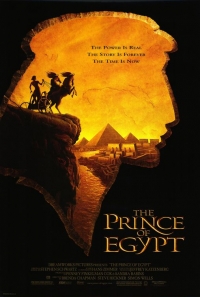
The Prince of Egypt is a 1998 American animated film, the first traditionally animated film produced and released by DreamWorks. The story follows the life of Moses from his birth, through his childhood as a prince of Egypt, and finally to his ultimate destiny to lead the Hebrew slaves out of Egypt, which is based on the Biblical story of Exodus.
Directed by Brenda Chapman, Simon Wells and Steve Hickner, the film featured songs written by Stephen Schwartz and a score composed by Hans Zimmer. The voice cast featured a number of major Hollywood actors in the speaking roles, while professional singers replaced them for the songs. The exceptions were Michelle Pfeiffer, Ralph Fiennes, Steve Martin, and Martin Short, who sang their own parts.
Three soundtracks were released simultaneously for The Prince of Egypt, each of them aimed towards a different target audience. While the other two accompanying records, the country-themed "Nashville" soundtrack and the gospel-based "Inspirational" soundtrack, functioned merely as movie tributes, the official Prince of Egypt soundtrack was the only album to contain tracks from the movie. This album combines elements from the score composed by Hans Zimmer, and movie songs by Stephen Schwartz. The songs were either voiced over by professional singers (such as Salisbury Cathedral Choir), or sung by the movie's voice actors, such as Michelle Pfeiffer and Ofra Haza. Various tracks by contemporary artists such as K-Ci & Jo-Jo and Boyz II Men were added, including the Mariah Carey and Whitney Houston duet "When You Believe", a Babyface rewrite of the original Schwartz composition, sung by Michelle Pfeiffer and Sally Dworsky in the movie.
The film was nominated for best score and won for Best Original Song at the 1999 Academy Awards for "When You Believe". The pop version of the song was performed at the ceremonies by Whitney Houston and Mariah Carey. The song, co-written by Stephen Schwartz, Hans Zimmer and with additional production by Babyface, was nominated for the Best Original Song (Motion Picture) at the 1999 Golden Globes, and was also nominated for Outstanding Performance of a Song for a Feature Film at the ALMA Awards.
Directed by Brenda Chapman, Simon Wells and Steve Hickner, the film featured songs written by Stephen Schwartz and a score composed by Hans Zimmer. The voice cast featured a number of major Hollywood actors in the speaking roles, while professional singers replaced them for the songs. The exceptions were Michelle Pfeiffer, Ralph Fiennes, Steve Martin, and Martin Short, who sang their own parts.
Three soundtracks were released simultaneously for The Prince of Egypt, each of them aimed towards a different target audience. While the other two accompanying records, the country-themed "Nashville" soundtrack and the gospel-based "Inspirational" soundtrack, functioned merely as movie tributes, the official Prince of Egypt soundtrack was the only album to contain tracks from the movie. This album combines elements from the score composed by Hans Zimmer, and movie songs by Stephen Schwartz. The songs were either voiced over by professional singers (such as Salisbury Cathedral Choir), or sung by the movie's voice actors, such as Michelle Pfeiffer and Ofra Haza. Various tracks by contemporary artists such as K-Ci & Jo-Jo and Boyz II Men were added, including the Mariah Carey and Whitney Houston duet "When You Believe", a Babyface rewrite of the original Schwartz composition, sung by Michelle Pfeiffer and Sally Dworsky in the movie.
The film was nominated for best score and won for Best Original Song at the 1999 Academy Awards for "When You Believe". The pop version of the song was performed at the ceremonies by Whitney Houston and Mariah Carey. The song, co-written by Stephen Schwartz, Hans Zimmer and with additional production by Babyface, was nominated for the Best Original Song (Motion Picture) at the 1999 Golden Globes, and was also nominated for Outstanding Performance of a Song for a Feature Film at the ALMA Awards.
Amy Grant
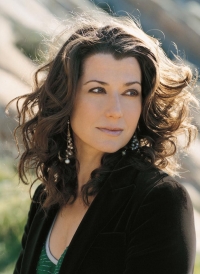
Amy Lee Grant (born November 25, 1960 in Augusta, Georgia) is an American singer-songwriter, best known for her Contemporary Christian Music and pop music, and a New York Times Bestselling author, TV personality, and occasional actress.
Grant is considered one of the true pioneers of Gospel and Contemporary Christian music..
Grant is considered one of the true pioneers of Gospel and Contemporary Christian music..
Songs for a New World
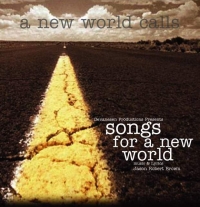
Songs for a New World is a work of musical theater written and composed by Jason Robert Brown. Its original off-Broadway production ran for 28 performances at the WPA Theater in New York City in 1995. The show sits on the boundary between musical and song cycle, but it is neither; it is an abstract musical, a series of songs all connected by theme rather than narrative. The show employs four performers who do not literally play the same characters throughout the show but who do have consistently developing character arcs nonetheless. It is far more than a revue or song cycle but it's not a standard narrative book musical. Composer Jason Robert Brown has said of his show, "It's about one moment. It's about hitting the wall and having to make a choice, or take a stand, or turn around and go back."
The original cast consisted of Brooks Ashmanskas, Andrea Burns, Jessica Molaskey, and Billy Porter (Porter's part was sung by Ty Taylor on the original cast recording). Daisy Prince, daughter of Broadway director Harold Prince directed. The original band consisted of Jason Robert Brown on piano, Randy Landau on bass, Tom Partington on drums, Joe Reina on keyboards, and Warren Smith & Rob McEwan on percussion. Songs for a New World was Jason Robert Brown's first produced show.
The piano features heavily throughout the show's music and because of its small cast and orchestra, Songs for a New World has become a favorite small show for colleges and local theatres, despite its vocally demanding score. The music of Songs for a New World is heavily influenced by a broad range of musical genres, including pop, gospel, jazz and classical music. Many of the songs combine elements of two or more of these genres. Some of the songs reference well-known historical and fictional characters, including Martin Luther King Jr., Mrs. Santa Claus, and Betsy Ross.
The original cast consisted of Brooks Ashmanskas, Andrea Burns, Jessica Molaskey, and Billy Porter (Porter's part was sung by Ty Taylor on the original cast recording). Daisy Prince, daughter of Broadway director Harold Prince directed. The original band consisted of Jason Robert Brown on piano, Randy Landau on bass, Tom Partington on drums, Joe Reina on keyboards, and Warren Smith & Rob McEwan on percussion. Songs for a New World was Jason Robert Brown's first produced show.
The piano features heavily throughout the show's music and because of its small cast and orchestra, Songs for a New World has become a favorite small show for colleges and local theatres, despite its vocally demanding score. The music of Songs for a New World is heavily influenced by a broad range of musical genres, including pop, gospel, jazz and classical music. Many of the songs combine elements of two or more of these genres. Some of the songs reference well-known historical and fictional characters, including Martin Luther King Jr., Mrs. Santa Claus, and Betsy Ross.
Les Miserables
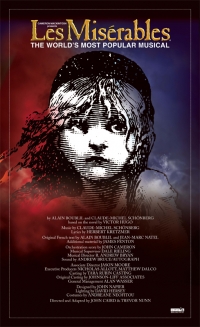
Les Misérables, colloquially known as Les Mis or Les Miz, is a musical composed in 1980 by the French composer Claude-Michel Schönberg with a libretto by Alain Boublil. Sung through, it is perhaps the most famous of all French musicals and one of the most performed musicals worldwide. On October 8, 2006, the show celebrated its 21st anniversary and became the longest-running West End musical in history and is still running (though it has changed venues).
Among the most famous songs of this Tony award-winning musical are "I Dreamed a Dream", "One Day More", "A Heart Full of Love", "Stars", "Bring Him Home", "Do You Hear the People Sing?", "Master of the House", and "On My Own."
The musical is based on the 1862 novel Les Misérables by Victor Hugo. Set in early 19th century France, it follows the intertwining stories of a cast of characters as they struggle for redemption and revolution. The characters include a paroled convict named Jean Valjean who, failing attempts to find work as an honest man with his yellow ticket of leave, breaks his parole and conceals his identity; the police inspector Javert who becomes obsessed with finding Valjean; Fantine, the single mother who is forced to become a prostitute to support her daughter; Cosette, who eventually falls in love with a French student named Marius Pontmercy. After Fantine dies, Cosette becomes Jean Valjean's adopted daughter; the Thénardiers, the unscrupulous innkeepers who thrive on cheating and stealing; Éponine, their young daughter who is hopelessly in love with Marius; Gavroche, a young beggar boy; and student leader Enjolras who plans the revolt to free the oppressed lower classes of France. The main characters are joined by an ensemble that includes prostitutes, student revolutionaries, factory workers, and others.
Among the most famous songs of this Tony award-winning musical are "I Dreamed a Dream", "One Day More", "A Heart Full of Love", "Stars", "Bring Him Home", "Do You Hear the People Sing?", "Master of the House", and "On My Own."
The musical is based on the 1862 novel Les Misérables by Victor Hugo. Set in early 19th century France, it follows the intertwining stories of a cast of characters as they struggle for redemption and revolution. The characters include a paroled convict named Jean Valjean who, failing attempts to find work as an honest man with his yellow ticket of leave, breaks his parole and conceals his identity; the police inspector Javert who becomes obsessed with finding Valjean; Fantine, the single mother who is forced to become a prostitute to support her daughter; Cosette, who eventually falls in love with a French student named Marius Pontmercy. After Fantine dies, Cosette becomes Jean Valjean's adopted daughter; the Thénardiers, the unscrupulous innkeepers who thrive on cheating and stealing; Éponine, their young daughter who is hopelessly in love with Marius; Gavroche, a young beggar boy; and student leader Enjolras who plans the revolt to free the oppressed lower classes of France. The main characters are joined by an ensemble that includes prostitutes, student revolutionaries, factory workers, and others.
Kiss Me, Kate
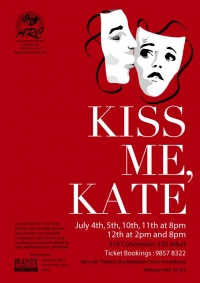
Kiss Me, Kate is a musical with music and lyrics by Cole Porter. It is structured as a play within a play, where the interior play is a musical version of The Taming of the Shrew.
Kiss Me, Kate was a comeback and a personal triumph for Cole Porter. After several successful musicals in the 1930s, notably Anything Goes, Du Barry Was a Lady, and Panama Hattie, he experienced an equestrian accident in 1937 that left him in constant pain. Following the accident, he continued to write songs and musicals but with limited success, and some thought he was past his prime. Kiss Me, Kate was a response to Rodgers and Hammerstein's Oklahoma! and other integrated musicals, and it proved to be his biggest hit and the only one of his shows to run for more than 1,000 performances on Broadway. It won the first Tony Award presented for Best Musical, in 1949.
Kiss Me, Kate was a comeback and a personal triumph for Cole Porter. After several successful musicals in the 1930s, notably Anything Goes, Du Barry Was a Lady, and Panama Hattie, he experienced an equestrian accident in 1937 that left him in constant pain. Following the accident, he continued to write songs and musicals but with limited success, and some thought he was past his prime. Kiss Me, Kate was a response to Rodgers and Hammerstein's Oklahoma! and other integrated musicals, and it proved to be his biggest hit and the only one of his shows to run for more than 1,000 performances on Broadway. It won the first Tony Award presented for Best Musical, in 1949.
Rent
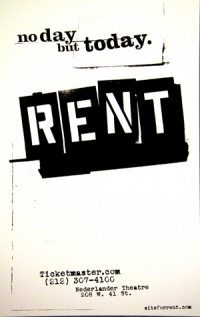
Rent is a rock musical, with music and lyrics by Jonathan Larson based on Giacomo Puccini's opera La Bohème. It tells the story of a group of impoverished young artists and musicians struggling to survive and create in New York's Lower East Side in the thriving days of the Bohemian East Village, under the shadow of AIDS.
Rent won a Tony Award for Best Musical and a Pulitzer Prize, among other awards. In addition, its cast was unusually ethnically diverse. Rent brought controversial topics to a traditionally conservative medium, and it helped to increase the popularity of musical theater amongst the younger generation. "Rent speaks to Generation X the way that the musical Hair spoke to the baby boomers or those who grew up in the 1960s, calling it "a rock opera for our time, a Hair for the 90s."
The musical was first seen at the New York Theatre Workshop in 1994. On January 26, 1996, Rent opened in New York City off-Broadway before moving to Broadway's Nederlander Theatre on April 29, 1996. Rent has been successful on Broadway, where it had critical acclaim and word-of-mouth popularity. The Broadway production of Rent closed on September 7, 2008 after a 12 year run and 5,124 performances, making it the seventh-longest-running Broadway show. The production has grossed over $280 million. At the time of its closing, it was the second-longest-running musical currently on Broadway, eight years behind The Phantom of the Opera.
Rent won a Tony Award for Best Musical and a Pulitzer Prize, among other awards. In addition, its cast was unusually ethnically diverse. Rent brought controversial topics to a traditionally conservative medium, and it helped to increase the popularity of musical theater amongst the younger generation. "Rent speaks to Generation X the way that the musical Hair spoke to the baby boomers or those who grew up in the 1960s, calling it "a rock opera for our time, a Hair for the 90s."
The musical was first seen at the New York Theatre Workshop in 1994. On January 26, 1996, Rent opened in New York City off-Broadway before moving to Broadway's Nederlander Theatre on April 29, 1996. Rent has been successful on Broadway, where it had critical acclaim and word-of-mouth popularity. The Broadway production of Rent closed on September 7, 2008 after a 12 year run and 5,124 performances, making it the seventh-longest-running Broadway show. The production has grossed over $280 million. At the time of its closing, it was the second-longest-running musical currently on Broadway, eight years behind The Phantom of the Opera.
The Sound of Music
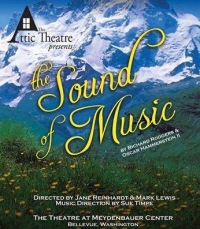
The Sound of Music is a musical with music by Richard Rodgers, lyrics by Oscar Hammerstein II, and a book by Howard Lindsay and Russel Crouse. It is based on the memoir of Maria von Trapp, The Story of the Trapp Family Singers. Songs from the musical that have become standards include "The Sound of Music", "Edelweiss", "My Favorite Things", "Climb Ev'ry Mountain", and "Do-Re-Mi".
The original Broadway production opened in November 1959, and the show has enjoyed numerous productions and revivals since then. It has also been made into an Academy Award-winning 1965 movie musical. The Sound of Music was the final musical written by Rodgers and Hammerstein; Hammerstein died of cancer nine months after the Broadway premiere.
The original Broadway production opened in November 1959, and the show has enjoyed numerous productions and revivals since then. It has also been made into an Academy Award-winning 1965 movie musical. The Sound of Music was the final musical written by Rodgers and Hammerstein; Hammerstein died of cancer nine months after the Broadway premiere.
Chicago
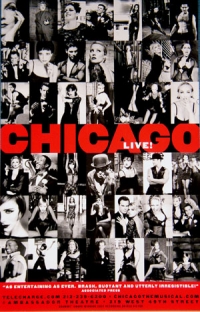
Chicago is a Kander and Ebb musical set in prohibition era Chicago. The book is by Ebb and Bob Fosse. The story is a satire on corruption in the administration of criminal justice, and the concept of the "celebrity criminal." The musical is based on a 1926 play of the same name by reporter Maurine Dallas Watkins about actual criminals and crimes she had reported on.
The original 1975 Broadway production ran for a total of 936 performances. Bob Fosse choreographed the original production, and his style is strongly identified with the show. Chicago's 1996 Broadway revival holds the record for the longest-running musical revival on Broadway (not counting the revue Oh! Calcutta!) and, as of March 2, 2008, it has played for more than 4,684 performances. The revival was followed by a production on London's West End and several tours and international productions. An Academy Award-winning film version of the musical was released in 2002.
The original 1975 Broadway production ran for a total of 936 performances. Bob Fosse choreographed the original production, and his style is strongly identified with the show. Chicago's 1996 Broadway revival holds the record for the longest-running musical revival on Broadway (not counting the revue Oh! Calcutta!) and, as of March 2, 2008, it has played for more than 4,684 performances. The revival was followed by a production on London's West End and several tours and international productions. An Academy Award-winning film version of the musical was released in 2002.
Spring Awakening
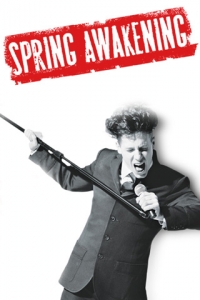
Spring Awakening is a Tony Award-winning rock musical with music by Duncan Sheik and book and lyrics by Steven Sater. The musical is based on the controversial 1891 German play of the same title by Frank Wedekind. Set in late-nineteenth century Germany, it concerns teenagers who are discovering the inner and outer tumult of sexuality. The original play was banned in Germany due to its portrayal of masturbation, abortion, rape and suicide. In the musical, alt-rock is employed as part of the folk-infused rock score. During the musical, characters sometimes break the fourth wall to express their motivations and desires directly to the audience.
After a number of workshops, concerts and rewrites over a seven-year period, Spring Awakening premiered Off-Broadway at the Atlantic Theatre Company on May 19, 2006 and ran through August 17, 2006. The show then opened on Broadway at the Eugene O'Neill Theatre on December 10, 2006 and received favorable reviews. Spring Awakening received eleven 2007 Tony Award nominations, winning eight, including Tonys for best musical, direction, book, score and featured actor. The show also won four Drama Desk Awards, including Outstanding Musical. The production is directed by Michael Mayer and choreographed by Bill T. Jones.
After a number of workshops, concerts and rewrites over a seven-year period, Spring Awakening premiered Off-Broadway at the Atlantic Theatre Company on May 19, 2006 and ran through August 17, 2006. The show then opened on Broadway at the Eugene O'Neill Theatre on December 10, 2006 and received favorable reviews. Spring Awakening received eleven 2007 Tony Award nominations, winning eight, including Tonys for best musical, direction, book, score and featured actor. The show also won four Drama Desk Awards, including Outstanding Musical. The production is directed by Michael Mayer and choreographed by Bill T. Jones.
Cats
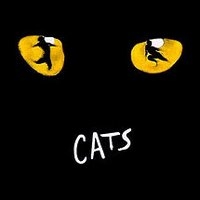
Cats is an award-winning musical composed by Andrew Lloyd Webber based on Old Possum's Book of Practical Cats by T. S. Eliot. The show has been performed around the world in numerous productions and has been translated into more than 20 languages. Cats has also been successfully made into a film recording.
Into the Woods
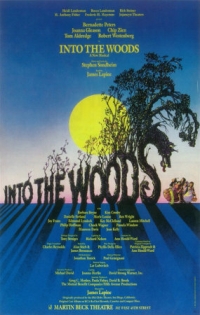
Into the Woods is an award-winning musical with music and lyrics by Stephen Sondheim and book by James Lapine. It debuted in San Diego at the Old Globe Theatre in 1986, and premiered on Broadway in 1987. Bernadette Peters' performance as the Witch, and Joanna Gleason's portrayal of the Baker's Wife, brought acclaim to the production during its original Broadway run. Into the Woods won several Tony Awards, including Best Score, Best Book, and Best Actress in a Musical (Joanna Gleason), in a year dominated by The Phantom of the Opera. The musical has been produced many times, with a 1988 national tour, a 1990 West End production, a 1991 television production, a 1997 tenth anniversary concert, a 2002 Los Angeles production and a 2002 Broadway revival.
Inspired by Bruno Bettelheim's 1976 book, The Uses of Enchantment, the musical intertwines the plots of several Brothers Grimm fairy tales and follows them further to explore the consequences of the characters' wishes and quests. The main characters are taken from the stories of Little Red Riding Hood, Jack and the Beanstalk, Rapunzel, and Cinderella, tied together by a more original story involving a Baker and his wife and their quest to begin a family, most likely taken from the original story of Rapunzel by the Brothers Grimm. It also includes references to several other well-known tales.
Inspired by Bruno Bettelheim's 1976 book, The Uses of Enchantment, the musical intertwines the plots of several Brothers Grimm fairy tales and follows them further to explore the consequences of the characters' wishes and quests. The main characters are taken from the stories of Little Red Riding Hood, Jack and the Beanstalk, Rapunzel, and Cinderella, tied together by a more original story involving a Baker and his wife and their quest to begin a family, most likely taken from the original story of Rapunzel by the Brothers Grimm. It also includes references to several other well-known tales.
Sweeney Todd: The Demon Barber of Fleet Street
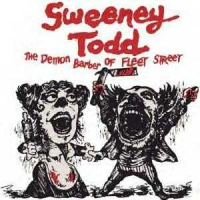
Sweeney Todd, the Demon Barber of Fleet Street: A Musical Thriller is a Tony Award-winning musical with a book by Hugh Wheeler and music and lyrics by Stephen Sondheim. The musical is based on the 19th century fictional character Sweeney Todd, though more specifically, the 1973 play Sweeney Todd, the Demon Barber of Fleet Street by Christopher Bond.
Sweeney Todd opened on Broadway at the Uris Theatre on March 1, 1979 and ran for 557 performances. It was directed by Harold Prince with musical staging by Larry Fuller, and starred Len Cariou as Sweeney Todd and Angela Lansbury as Mrs. Lovett. The musical tells the story of Sweeney Todd, who was previously known as Benjamin Barker, who returns from Australia where he has spent fifteen years on false charges. When he learns from Mrs. Lovett, whose meat pies are the worst in London, that his wife poisoned herself after being raped by Judge Turpin (the man who wrongly imprisoned him), and that his daughter is the ward of the same Judge Turpin, he vows revenge.
A feature film adaptation of Sweeney Todd, jointly produced by Dreamworks and Warner Bros., was released on December 21, 2007. Tim Burton directed from a screenplay by John Logan. It stars Johnny Depp as Todd (Depp received an Oscar nomination and a Golden Globe award for his performance), Helena Bonham Carter as Mrs. Lovett, Alan Rickman as Judge Turpin, Sacha Baron Cohen as Signor Pirelli, Jamie Campbell Bower as Anthony Hope, Laura Michelle Kelly as The Beggar Woman, Jayne Wisener as Johanna, Ed Sanders as Toby, and Timothy Spall as Beadle Bamford.
Sondheim's score is one of his most complex to date, with orchestrations by his long-time collaborator Jonathan Tunick. It relies heavily on counterpoint and rich, angular harmonies. Its compositional style has been compared to those of Maurice Ravel, Sergei Prokofiev, and Bernard Herrmann (who scored Alfred Hitchcock films). Sondheim also quotes the ancient Dies Irae Gregorian chant, both as part of the eponymous ballad that runs throughout the score, later heard in a musical inversion, and in the accompaniment to "Epiphany". He also relies heavily on leitmotif - at least twenty distinct ones can be identified throughout the score. Depending on how and where the show is presented, it is sometimes considered an opera. Sondheim himself has described the piece as a "black operetta." An original Broadway cast recording was released in 1979. It included the Judge's "Johanna" and the tooth-pulling contest from Act I, which had been cut in previews.
Sweeney Todd opened on Broadway at the Uris Theatre on March 1, 1979 and ran for 557 performances. It was directed by Harold Prince with musical staging by Larry Fuller, and starred Len Cariou as Sweeney Todd and Angela Lansbury as Mrs. Lovett. The musical tells the story of Sweeney Todd, who was previously known as Benjamin Barker, who returns from Australia where he has spent fifteen years on false charges. When he learns from Mrs. Lovett, whose meat pies are the worst in London, that his wife poisoned herself after being raped by Judge Turpin (the man who wrongly imprisoned him), and that his daughter is the ward of the same Judge Turpin, he vows revenge.
A feature film adaptation of Sweeney Todd, jointly produced by Dreamworks and Warner Bros., was released on December 21, 2007. Tim Burton directed from a screenplay by John Logan. It stars Johnny Depp as Todd (Depp received an Oscar nomination and a Golden Globe award for his performance), Helena Bonham Carter as Mrs. Lovett, Alan Rickman as Judge Turpin, Sacha Baron Cohen as Signor Pirelli, Jamie Campbell Bower as Anthony Hope, Laura Michelle Kelly as The Beggar Woman, Jayne Wisener as Johanna, Ed Sanders as Toby, and Timothy Spall as Beadle Bamford.
Sondheim's score is one of his most complex to date, with orchestrations by his long-time collaborator Jonathan Tunick. It relies heavily on counterpoint and rich, angular harmonies. Its compositional style has been compared to those of Maurice Ravel, Sergei Prokofiev, and Bernard Herrmann (who scored Alfred Hitchcock films). Sondheim also quotes the ancient Dies Irae Gregorian chant, both as part of the eponymous ballad that runs throughout the score, later heard in a musical inversion, and in the accompaniment to "Epiphany". He also relies heavily on leitmotif - at least twenty distinct ones can be identified throughout the score. Depending on how and where the show is presented, it is sometimes considered an opera. Sondheim himself has described the piece as a "black operetta." An original Broadway cast recording was released in 1979. It included the Judge's "Johanna" and the tooth-pulling contest from Act I, which had been cut in previews.
Little Shop of Horrors
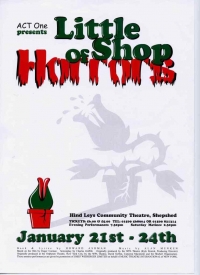
Little Shop of Horrors is a rock musical by composer Alan Menken and writer Howard Ashman, about a nerdy florist shop worker who raises a plant that feeds on human blood. The musical was based on the low-budget 1960 black comedy The Little Shop of Horrors, directed by Roger Corman. The music, composed by Menken in the style of 1960s rock and roll, doo-wop and early Motown, included several show-stoppers including "Skid Row (Downtown)", "Somewhere That's Green", and "Suddenly, Seymour", as well as the title song.
In addition to the original long-running 1982 off-Broadway production and subsequent Broadway production, the musical has been performed all over the world, including in Buenos Aires, Sydney, Vienna, São Paulo, Toronto, Copenhagen, Helsinki, Paris, Berlin, Athens, Budapest, Reykjavík, Jerusalem, Rome, Tokyo, Zurich, Athens, Barcelona, Cologne, Mexico City, Auckland, Oslo, Singapore City, Johannesburg, Madrid, Stockholm, Seinajoki, Akureyri, Vaasa, and London. The musical was also performed in Bogota, Colombia in July 2008. Because of its small cast and relatively simple orchestrations, it has become popular with community theatre and high school groups. The musical was also made into a 1986 film of the same name, directed by Frank Oz.
In addition to the original long-running 1982 off-Broadway production and subsequent Broadway production, the musical has been performed all over the world, including in Buenos Aires, Sydney, Vienna, São Paulo, Toronto, Copenhagen, Helsinki, Paris, Berlin, Athens, Budapest, Reykjavík, Jerusalem, Rome, Tokyo, Zurich, Athens, Barcelona, Cologne, Mexico City, Auckland, Oslo, Singapore City, Johannesburg, Madrid, Stockholm, Seinajoki, Akureyri, Vaasa, and London. The musical was also performed in Bogota, Colombia in July 2008. Because of its small cast and relatively simple orchestrations, it has become popular with community theatre and high school groups. The musical was also made into a 1986 film of the same name, directed by Frank Oz.
High School Musical
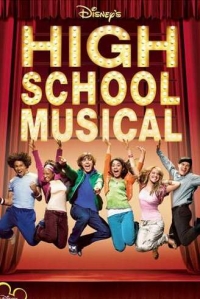
High School Musical is an Emmy Award-winning American television film. Upon its release on January 20, 2006, it became the most successful Disney Channel Original Movie (DCOM) ever produced, with a television sequel High School Musical 2 released in 2007 and the feature film High School Musical 3: Senior Year to be released theatrically in October 2008. It will be the first Disney Channel Original movie to have a theatrical sequel. A fourth installment, High School Musical 4, has been announced to be in the writing stages.
High School Musical was Disney Channel's most watched movie at its time, with 7.7 million viewers in its premiere broadcast in the US. In the UK, it received 789,000 viewers for its premiere (and 1.2 million viewers overall during the first week), making it the second most watched program for the Disney Channel (UK) of 2006. It was also the first ever Disney Channel Original Movie to be broadcast on the BBC on December 29, 2006. The film's soundtrack was the best-selling album in the United States for 2006.
With a plot described by the author and numerous critics as a modern adaptation of Romeo & Juliet, High School Musical is a story about two high school juniors from rival cliques – Troy Bolton (Zac Efron), captain of the basketball team, and Gabriella Montez (Vanessa Hudgens), a beautiful and shy transfer student who excels in math and science. Together, they try out for the lead parts in their high school musical, and as a result, divide the school. Despite other students' attempts to thwart their dreams, Troy and Gabriella resist peer pressure and rivalry, inspiring others along the way not to "stick with the status quo."
High School Musical was filmed at East High School located in Salt Lake City, Utah, the auditorium of Murray High School, & Downtown Salt Lake City. Murray High School was also the set of: Take Down (1978), Read It and Weep (2006), Minutemen (2008) and High School Musical: Get in the Picture (2008).
High School Musical was Disney Channel's most watched movie at its time, with 7.7 million viewers in its premiere broadcast in the US. In the UK, it received 789,000 viewers for its premiere (and 1.2 million viewers overall during the first week), making it the second most watched program for the Disney Channel (UK) of 2006. It was also the first ever Disney Channel Original Movie to be broadcast on the BBC on December 29, 2006. The film's soundtrack was the best-selling album in the United States for 2006.
With a plot described by the author and numerous critics as a modern adaptation of Romeo & Juliet, High School Musical is a story about two high school juniors from rival cliques – Troy Bolton (Zac Efron), captain of the basketball team, and Gabriella Montez (Vanessa Hudgens), a beautiful and shy transfer student who excels in math and science. Together, they try out for the lead parts in their high school musical, and as a result, divide the school. Despite other students' attempts to thwart their dreams, Troy and Gabriella resist peer pressure and rivalry, inspiring others along the way not to "stick with the status quo."
High School Musical was filmed at East High School located in Salt Lake City, Utah, the auditorium of Murray High School, & Downtown Salt Lake City. Murray High School was also the set of: Take Down (1978), Read It and Weep (2006), Minutemen (2008) and High School Musical: Get in the Picture (2008).
Avenue Q
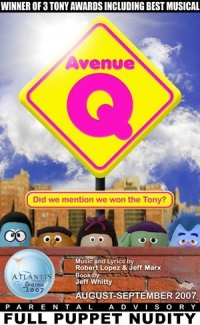
Avenue Q is a musical conceived by Robert Lopez and Jeff Marx, who wrote the music and lyrics, and directed by Jason Moore. The book is by Jeff Whitty. The show was produced by and opened at the Off-Broadway Vineyard Theatre in March 2003. The production transferred to Broadway in July 2003 and won several Tony Awards, including the award for Best Musical. It is still running on Broadway and holds the position of 26th longest running musical in Broadway history. The show has spawned a 2005 Las Vegas production, a 2006 West End production and various international productions. A U.S. national tour began in July 2007.
The show is largely inspired by (and is in the style of) Sesame Street: Most of the characters in the show are puppets (operated by actors onstage), the set depicts several tenements on a rundown street in an "outer borough" of New York City, both the live characters and puppet characters sing, and short animated video clips are played as part of the story. Also, several characters are recognizably parodies of classic Sesame Street characters: for example, the roommates Rod and Nicky are versions of Sesame Street's Bert and Ernie, and Trekkie Monster is based on Cookie Monster. However, the characters are in their twenties and thirties and face adult problems instead of those faced by pre-schoolers, thus making the show more suited for the adults who grew up with Sesame Street. The characters use profanity, and the songs concern adult themes (except the opening number). A recurring theme is the central character's search for a "purpose." Since the musical soundtrack for it was released, the song "The Internet is For Porn" has become particularly popular on websites such as YouTube and can be downloaded for free from the official website. According to the official site, the musical is appropriate for both adults and teenagers.
The show is largely inspired by (and is in the style of) Sesame Street: Most of the characters in the show are puppets (operated by actors onstage), the set depicts several tenements on a rundown street in an "outer borough" of New York City, both the live characters and puppet characters sing, and short animated video clips are played as part of the story. Also, several characters are recognizably parodies of classic Sesame Street characters: for example, the roommates Rod and Nicky are versions of Sesame Street's Bert and Ernie, and Trekkie Monster is based on Cookie Monster. However, the characters are in their twenties and thirties and face adult problems instead of those faced by pre-schoolers, thus making the show more suited for the adults who grew up with Sesame Street. The characters use profanity, and the songs concern adult themes (except the opening number). A recurring theme is the central character's search for a "purpose." Since the musical soundtrack for it was released, the song "The Internet is For Porn" has become particularly popular on websites such as YouTube and can be downloaded for free from the official website. According to the official site, the musical is appropriate for both adults and teenagers.
High School Musical 2
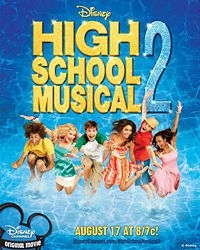
High School Musical 2 (also known as High School Musical 2: Sing It All Or Nothing!) is the sequel to the Disney Channel Original Movie, High School Musical. It debuted on August 17, 2007 on Disney Channel in the U.S., and on Family in Canada. The premiere brought in a total of 17.3 million viewers in the United States—almost 10 million more than its predecessor—making it, at the time, the highest-rated basic-cable broadcast in U.S. history.
Children of Eden
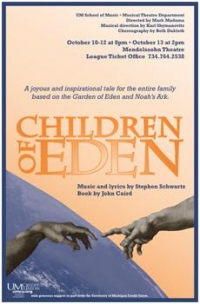
Children of Eden is a two-act musical play with music and lyrics by Stephen Schwartz based on a book by John Caird. The musical is loosely based on the Book of Genesis. Act I tells the story of Adam and Eve, Cain, and Abel, and Act II deals with Noah and the Flood. While using the Bible as a plot source, it freely deviates in many details, and is a story of parents and children without a specifically religious point-of-view. Though it had a very short run on London's West End and has never played Broadway, the show is extremely popular in community theatres worldwide. The show uses the same principals in both acts, with the actors each taking on a different character for the story of Noah.
Mamma Mia!
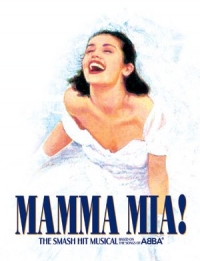
Mamma Mia! is a stage musical with a book by British playwright Catherine Johnson, based on the songs of ABBA, composed by Benny Andersson and Björn Ulvaeus. It is an example of a jukebox musical, and is notable for popularising the genre. The plot is adapted from the 1968 film Buona Sera, Mrs. Campbell starring Gina Lollobrigida.
Although the title of the musical is taken from the group's 1975 chart-topper "Mamma Mia", the musical's plot has nothing to do with the story of the group itself.
Björn Ulvaeus and Benny Andersson, who composed the original music for ABBA, have been involved in the development of the show from the beginning. Anni-Frid Lyngstad has been involved financially in the production, while Agnetha Fältskog has not, though she was present at the Swedish premiere and final show.
The musical includes such hits as "Super Trouper", "Dancing Queen", "Knowing Me, Knowing You", "Thank You for the Music", "Money, Money, Money", "The Winner Takes It All", "Voulez Vous", "I Have a Dream" and "SOS". It had been seen by over ten million people worldwide as of July 2003. Estimates of 2007, is that 30 million have now seen Mamma Mia!. Since its opening in 1999, the production has grossed US$2.0 billion in earnings.
A film version of Mamma Mia!, starring Meryl Streep, Colin Firth, Pierce Brosnan, Amanda Seyfried, Christine Baranski and Julie Walters began shooting in June 2007 and premiered in July 2008.
Although the title of the musical is taken from the group's 1975 chart-topper "Mamma Mia", the musical's plot has nothing to do with the story of the group itself.
Björn Ulvaeus and Benny Andersson, who composed the original music for ABBA, have been involved in the development of the show from the beginning. Anni-Frid Lyngstad has been involved financially in the production, while Agnetha Fältskog has not, though she was present at the Swedish premiere and final show.
The musical includes such hits as "Super Trouper", "Dancing Queen", "Knowing Me, Knowing You", "Thank You for the Music", "Money, Money, Money", "The Winner Takes It All", "Voulez Vous", "I Have a Dream" and "SOS". It had been seen by over ten million people worldwide as of July 2003. Estimates of 2007, is that 30 million have now seen Mamma Mia!. Since its opening in 1999, the production has grossed US$2.0 billion in earnings.
A film version of Mamma Mia!, starring Meryl Streep, Colin Firth, Pierce Brosnan, Amanda Seyfried, Christine Baranski and Julie Walters began shooting in June 2007 and premiered in July 2008.
Grease
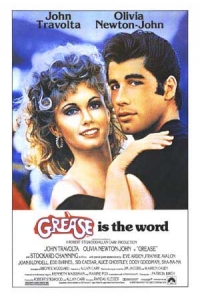
Grease is a film directed by Randal Kleiser and based on Jim Jacobs' and Warren Casey's musical, Grease. The film stars John Travolta, Olivia Newton-John, Stockard Channing, Jeff Conaway, and Eve Arden. It was originally released to theatres on June 16, 1978. It was filmed at Venice High School in Venice, California. It was released in the U.S. on VHS during the 1980s; the latest VHS release was June 23, 1998 as 20th Anniversary Edition following a theatrical re-release that March. On September 24, 2002, it was released on DVD for the first time. On September 19, 2006, it was re-released on DVD as the Rockin' Rydell Edition, which includes a black Rydell High T-Bird jacket cover or the Target-exclusive Pink Ladies cover.
Seussical
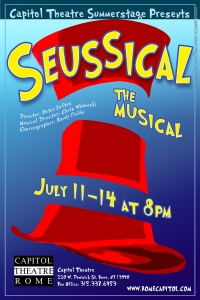
Seussical is a musical based on the books of Dr. Seuss that debuted on Broadway in 2000. The play's story is a rather complex amalgamation of many of Seuss's most famous books. After an unsuccessful Broadway run, the production spawned two US National Tours and has become a favorite for community and regional theatres.
 Sheet Music Exchange is a web site for those who wants to access popular sheet music easily,
letting them download the sheet music for free for trial purposes.
It's completely free to download and try the listed sheet music, but you have to delete the files after 24 hours of trial period.
Don't forget, if you like the piece of music you have just learned playing,
treat the artist with respect, and go buy the original sheet music.
Sheet Music Exchange is a web site for those who wants to access popular sheet music easily,
letting them download the sheet music for free for trial purposes.
It's completely free to download and try the listed sheet music, but you have to delete the files after 24 hours of trial period.
Don't forget, if you like the piece of music you have just learned playing,
treat the artist with respect, and go buy the original sheet music.